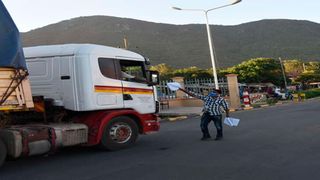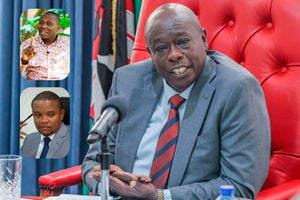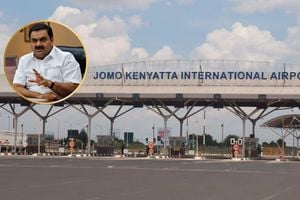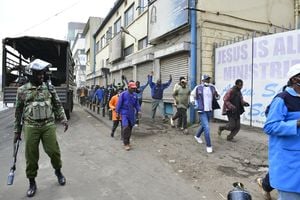
Police officers releasing trucks at the Namanga Border Point on May 22, 2020.
| Evans Habil | Nation Media GroupBusiness
Premium
John Magufuli leaves Dar-Nairobi trade reeling
Kenyan exports to Tanzania have fallen consistently since 2015 when President John Pombe Magufuli, or famously referred to as the bulldozer came into office, imports have not. In 2015 Kenya exported goods worth Sh42.7 billion but last year it exported Sh29.4 billion to its biggest neighbourhood rival.
Meanwhile imports from Tanzania have grown from Sh17.2 billion in 2015 to Sh26.1 billion last year.
Kenya had met a formidable dealmaker Tanzania, more specifically in President Magufuli, who passed away last week.
East Africa Community (EAC) had been Kenya’s playground as the biggest economy pulling weight above neighbours with more natural resources and leveraging access to the sea to cow land-locked countries, but that was about to change.
President Kibaki and President Jakaya Kikwete were less antagonistic and minimised competition in the region and their legacy brought the best ties between Kenya and Tanzania since independence.
In a speech in Kenya’s parliament in October 2015, President Kikwete, who was the Foreign Affairs minister when EAC was revived in 2000, said only a fool would reverse the policy.
But in the first year of President Kenyatta’s reign, Kenyans moved against Tanzania pulling Uganda and Rwanda into the Coalition of the Willing (CoW).
Dismantle this hegemony
It would mark the resolve of President Magufuli two years later to dismantle this hegemony.
After he took over as Tanzania’s fifth president, it did not take long for the region to realise it was not going to be business as usual. Kenya-Tanzania trade immediately plunged to a decade low.
And it was not just trade, he re-ignited rivalry to the centre of a regional geopolitics driving the shift that saw Tanzania capture the crude oil pipeline from Uganda and also lured Rwanda’s SGR from Kenya.
The fact that EAC advocated for free movement of goods and services did not stop him from adopting a strong policy of shielding his country's domestic industries from foreign competition through a mix of punitive taxes and denial of operating licenses.
His administration also frowned on importation of basic goods as well as farm produce from neighbours.
After banning chick importation in 2007, Tanzanian police have on several occasions set ablaze thousands of one-day old chicks illegally imported through the northern Namanga border with Kenya.
“There have been a lot of political issues over the past decade, border closures between Rwanda and Uganda, Rwanda and Burundi and Kenya and Tanzania,” Kenya Association of Manufactures chairman Mucai Kunyiha said last week.
“We need to realise we have a great opportunity to trade in the region with a market of 400 million people. We have materials they need and they have what we need. Kenya for instance gets a lot of maize from Uganda and Tanzania what we need to understand is that East Africa is not just about selling to them, there needs to be a balance where everyone gains,” he said.
The Tanzanian President who previously worked as a chemistry and maths teacher, recently directed his ministry of Industry and Trade to raise tax imposed on export hides and skins possibly to 100 percent from 80 percent in order to discourage exportation.
He also pushed aggressively for foreign companies to employ from the local population, regardless of the position. It was not uncommon for a newly appointed chief executive officer of a company to be denied a work permit, if he felt that there was a local citizen who could do the job.
Tanzania’s Magufuli has taught Kenya a lesson in regional diplomacy dismantling assumptions that it is more concerned with Southern African Development Community than EAC in just a few years.
The pipeline deal with Uganda was his major victory that has severed the head off the Northern Corridor in ways no one imagined, setting stage for crippling other CoW alliance projects.
Kenya, as usual thought it had bagged Uganda for an oil pipeline connecting the rich fields around Lake Albert and branching north to South Sudan all the way to Lamu as the gate to new found EAC riches.
Go separate ways
But before pen hit the paper, matters changed very drastically in April 2016, when President Kenyatta and his Ugandan counterpart Yoweri Museveni met at the 13th Summit of the Northern Corridor Integration Projects held at the Munyonyo Commonwealth Hotel in Kampala.
After the meeting, it was clear that Kenya and Uganda had decided to go separate ways in as far as the building of crude oil pipeline was concerned.
However, after the meeting, and to cover the diplomatic row, the two leaders emerged and announced that they had agreed that two crude oil pipelines would be constructed instead.
Tanzania had quietly approached Uganda, and entered in a parallel agreement to explore the possibility of building a crude between the two countries.
Uganda would officially abandon Kenya in September 2020 after it signed a Sh410 billion ($3.5 billion) deal with Tanzania, leaving Nairobi to embark on the long trek alone.
The deal signed on a Sunday between President Magufuli and Museveni meant that Kampala would route its oil exports via Tanzania, through the 1,445-kilometre crude oil pipeline.
About 80 percent of the pipeline will run through Tanzania and the project is expected to create more than 18,000 jobs for Tanzanians.
Rwanda, a former CoW alliance member also later signed an agreement with Tanzania to extend the SGR line from the Central Corridor from Isaka to Kigali.
Rwanda also agreed to extend the line to Rubavu in the border with DRC. which President Felix Tshekedi had appraised during a State visit to Tanzania in June 2019. Tanzania also hopes to lock in Burundi through the Uvinza-Gitega line, which will link to Eastern DRC.
And Magufuli played his diplomacy cards so well he lured President Kenyatta to his home town of Chato, the first for a sitting Kenya president on a private trip just to talk out an export ban of Maize to Kenya.
It was his-Coup de grâce, if, only there had not been rumours that he had to come to Kenya for medical attention at the tail end of his life.






